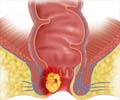As many as 1 out of 3 cancer deaths in both humans and dogs could be prevented by reducing Omega-6 fatty acids and cutting calories, new research has revealed.

Too much Omega-6 fatty acid can lead to inflammation, which creates an environment conducive to cancer in dogs and people, he said.
In addition, Dressler said studies show obesity in both dogs and humans limits the production of adiponectin, a hormone that has been shown to inhibit cancer cell growth.
He recommended reducing calories, particularly those from sugar, which has the additional danger of not only causing obesity, but also feeding cancer cells and encouraging their growth.
In comparing human and canine cancer, Dressler bases his research on evidence that dogs have similar cancers to humans, and veterinary oncology uses almost all the human cancer drugs to treat dogs.
A dog's compressed lifespan allows researchers to see effects of the drugs quickly and apply those findings to humans.
Advertisement
In addition, adding quality prebiotics to pet foods can enhance their gut health, he said, although research still is needed to determine how much is appropriate for an individual breed.
Advertisement
Source-ANI















